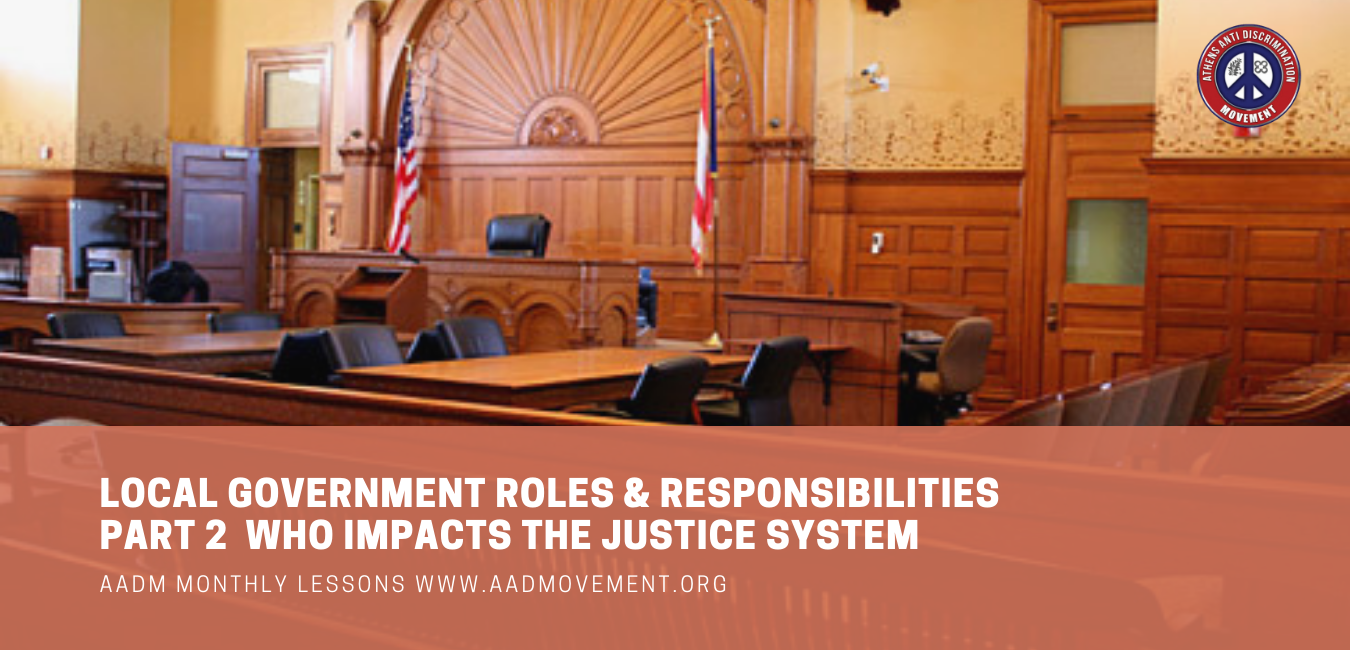
AADM Monthly Lessons: Local Government Roles and Responsibilities: Criminal Justice Reform and Who Impacts the Justice System
By Raiana Kelly, AADM Contributing Writer
July 11, 2019
According to the Bureau of Justice Statistics, nearly 2.2 million people were incarcerated in the United States at the end of 2016. After the 2018 midterms, one thing became clear across the country: criminal justice reform is an issue that receives bipartisan support. When we hear about criminal justice reform, the focus is often on the Federal Government. However, the majority of incarcerated individuals are held in state prisons and local jails and nearly all police work is conducted at the state and local levels. Given the support for criminal justice reform nationwide and within Athens, it’s important to understand what it is, who impacts the justice system, and how. Some of the individuals that have the greatest influence on our criminal justice system are our district attorney, our solicitor general, and our judges.
Criminal justice reform aims to remedy the perceived failures of the criminal justice system. This can include the expansion of pretrial services, increased access to social services, elimination of cash bail for low-level offenses, the reduction of arrests by issuing misdemeanor citations, and more. In Athens, recent criminal justice reform actions are focused on probation reform and misdemeanor cash bail reform as part of the Freedom Act.
Our District Attorney, Ken Mauldin, is an elected official that primarily serves as the prosecuting attorney in the Superior Court of Athens-Clarke and Oconee counties, and is responsible for the prosecution of all criminal cases involving at least one felony. Most importantly, our district attorney holds the power of exercising discretion in determining if, who, and how to prosecute. This means that when deciding what the charges are, they may choose to ignore certain aspects of a law. For example, a district attorney may choose to ignore or not act on low-level marijuana arrests even though marijuana is illegal in Georgia. In addition to these responsibilities, our district attorney serves as the official legal adviser to the grand jury and thus has a substantial amount of power in obtaining an indictment.
Our Solicitor General, C.R. Chisholm, serves as the prosecuting attorney in State Court and the ACC and Winterville municipal courts. Like our district attorney, our solicitor general has the power of discretion to decide if and how to prosecute misdemeanor offenses. Additionally, our solicitor general provides legal advice to the executive and represents the government in court proceedings, particularly in constitutional matters.
There are multiple judges that preside over different courts. The primary responsibilities of our judges include keeping order and overseeing proceedings, instructing the jury of laws that apply to a case, determining if evidence is illegal or improper, and imposing sentences. Our district attorney and solicitor general, as prosecutors, decide what the charges are. The judge may dismiss the charges if they feel they are wrong, allowing the prosecutor to either change or drop the charges, often in exchange for a plea.
Working together, our district attorney, solicitor general, and judges have enormous power over what happens within our criminal justice system. Elected officials are supposed to act based on the desire of their constituents; by participating in local politics and electing judicial leaders that reflect our values and principles, we can ensure a more fair and just criminal justice system; one that finds alternatives to incarceration. If you’re interested in learning more or want to get involved, join the movement by visiting www.aadmovement.org.
